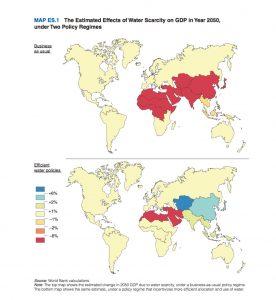A new report by a team from the World Bank offers hope for the ability of most of the world to cope with increasing water scarcity associated with climate change.

Climate change is water change
The headlines following the report’s release have been grim: “Global water shortages to deliver ‘severe hit’ to economies, World Bank warns“, to cite one typical example. But for most regions of the world, the study found, there is a crucial caveat – a severe hit to economies if nations do nothing to change their water allocation institutions. In other words, even under the stress of climate change, there is likely to be enough water available for most of the world (northern Africa and the Middle East standing as important exceptions) to still prosper economically if water management institutions can keep up with the changing climate.
Getting the distribution of water right will go a long way toward decoupling water use from economic growth. In many regions, water resources have been over-allocated, and climate change will compound the scarcity. If but a small part of water use were allocated to bring supply and demand into balance, many anticipated problems of climate and socio-economic scarcity could be resolved.
The details of the maps’ geography are important. First, they suggest that even without changes in water governance, the cumulative impact of climate change-caused water shortages will be relatively modest in the Americas. They also suggest that, with good governance, China can prosper under climate change despite its widely reported water problems.
This “getting the distribution of water right” is no small thing. Good governance is hard, and the people living under bad governance face all sorts of problems. Water is just one of them. Climate change creates a world less forgiving of bad governance. But the report suggests that the problem we face is tractable – that there’s enough water for most of the world’s people well into to the future if we can get the water management institutions right.
